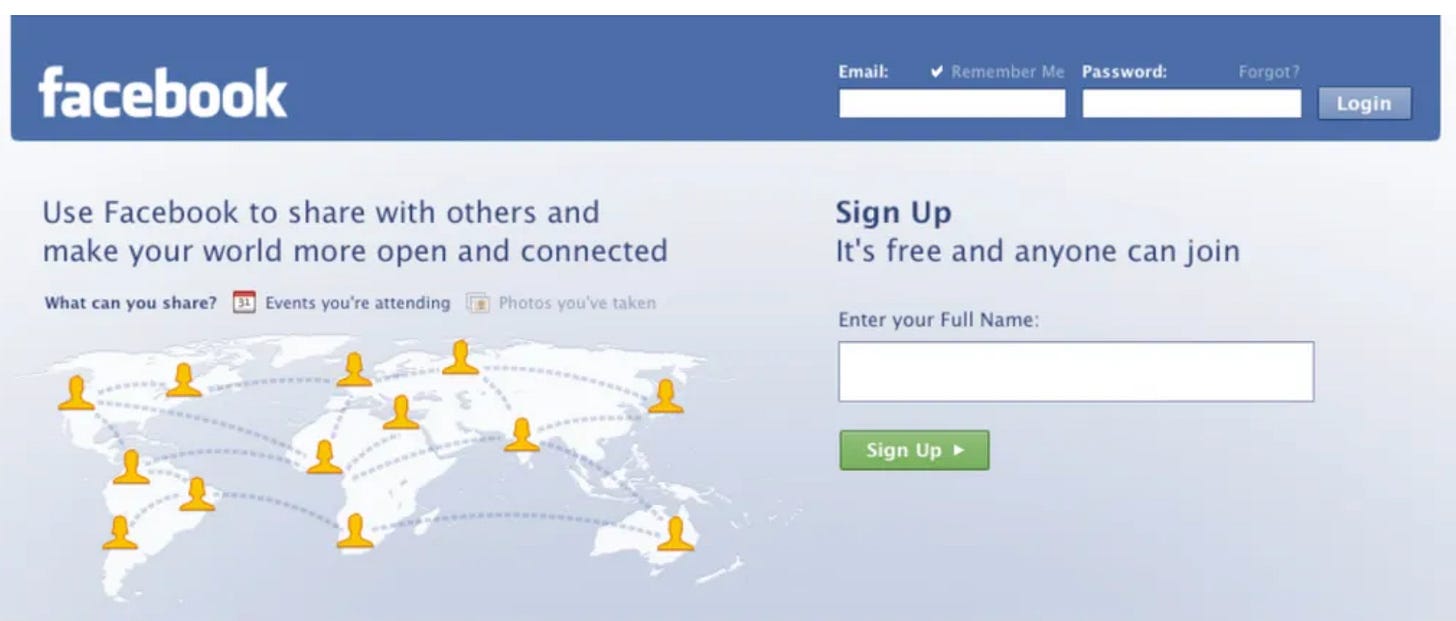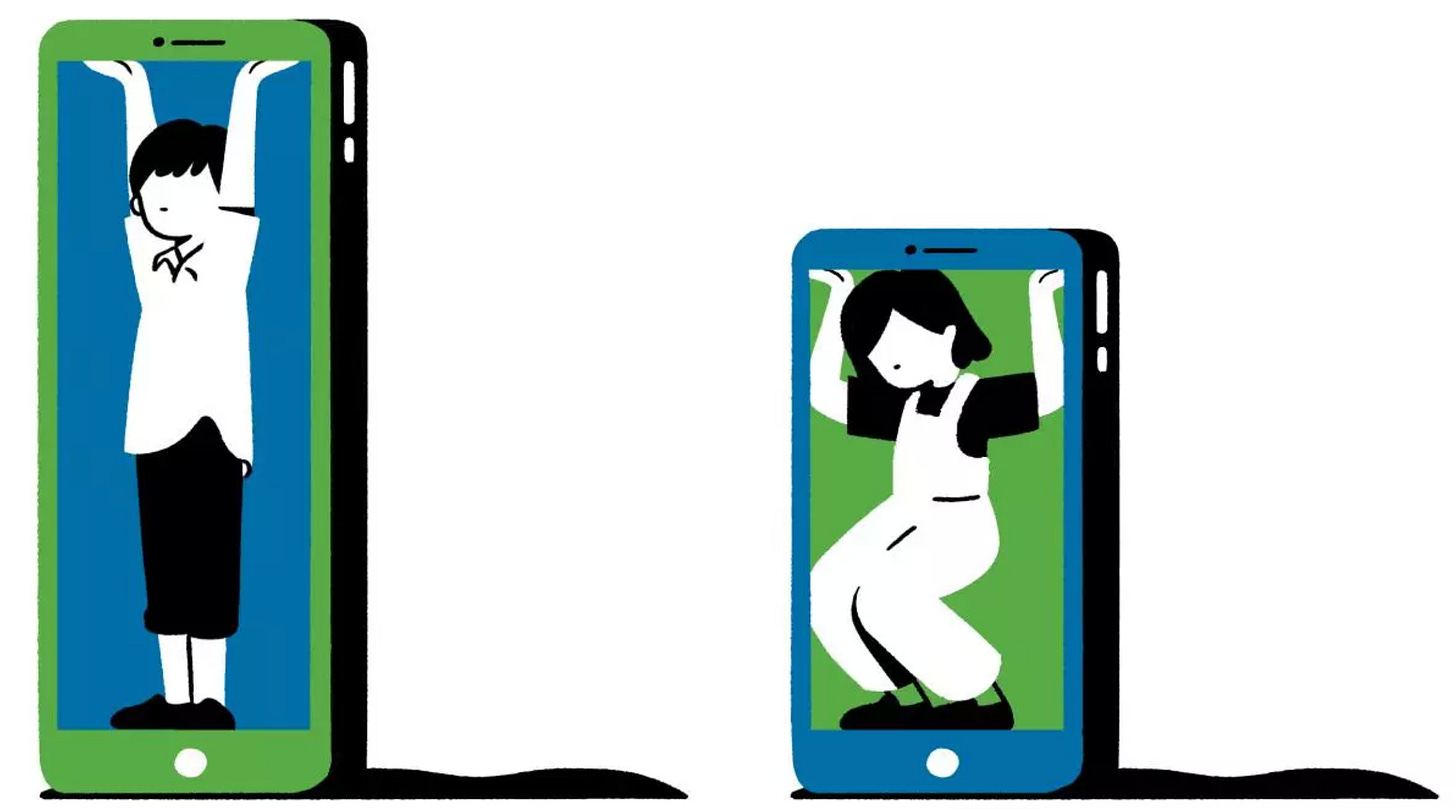Internet, Odi et Amo 🌐
Banning smartphones from classrooms and my top five pieces of content from the Internet
📝 Words: 1,379 | 🕰️ Estimated Reading time: about 7 mins
TL;DR
🗒️ Newsletter feedback: a couple made "Getting Better" their Sunday tradition. Unexpected and heartwarming.
🧑💻 Youtube binges and adolescence: reflections on the impact of Internet and the long-term results of banning smartphones from schools in Norway.
🧠 Personal note: Despite distractions, Internet has improved my life. Sharing my top five reads I found there.
❤️After only 2 weeks, you’ve been showing so much love to this newsletter that I started to think it’s too much.
💑 For example, last week a lovely couple have told me they make it a Sunday tradition to read and discuss each “Getting Better” issue together.
Becoming a couple’s topic of discussion is some “next-level” accomplishment.
One that I would never expected to reach after only 2 weeks.
This one is for you.
Also, many of you have shared with me some valuable feedback.
To you:
But now, let’s get started: Internet, Odi et Amo1
Nowadays, more than 5 billion people have access to Internet.
We have an incredible amount of information available at fingerprint speed.
Information that only 30 years ago was unimaginable to obtain with that ease.
Yet, when in 2008, at 16, I got daily Internet access for the first time, I spent all my days on the entertaining part of Internet (YouTube and social media above all).
I was relatively old compared to how early teenagers get Internet access today2.
It was the early days of Facebook and Youtube.
And I vividly remember how this new technology affected my life.

After school, I'd spend hours on YouTube, mostly watching music videos, football clips, and pranks. Often alone, rarely with a couple of friends.
Facebook instead served as a silent observer of other people’s lives.
Some sort of a digital “teenage wasteland”.
Many hours wasted, doing nothing but observing, and only sometimes interacting.
🍀 I was lucky.
I was good at school, I had already formed my circle of close friends, and I did not need that much of external validation from my peers anymore.
In the end, this was just a diversion from schoolwork, football, and music, and not my primary focus.
However, technology is today more portable, personalized, and engaging than ever.
As a teenager, feeling ashamed of some aspects of your life is normal.
In the past the risk of experiencing embarrassing moments was generally limited to your peers at school, at worst.
Nowadays, a single tweet or a Tik Tok video can expose you to millions across the globe 🌎.
Those born after 1995 were the first to go through puberty with “a portal to an alternative universe in their pockets”.
And the effect on their wellbeing has been devastating.
Consider these numbers: from 2010 to 2020, the rate of self-harm for
young adolescent girls (aged 10-14) nearly tripled
for girls aged 15-19 doubled
for women over 24 went down
Also, the suicide rate for young adolescent increased by 167% from 2010 to 2021.
I know.
These numbers are not easy to read on a Sunday afternoon, and honestly worrying.
But getting better at life also means becoming a bit more aware of the things that surround us, a bit more empathetic and a bit less cynical.
After becoming a father, I’m incredibly more sensitive to these topics.
And while I can't predict which technology or social media will dominate in 10-15 years, I'm sure it won't be any less pervasive than today's.
So one’s gotta be prepared.
Looking back at the numbers, something happened in the 2010s:
The arrival of smartphones (with instant Internet access) and social media.
In 2023, nearly 46% of teens said they used Internet “almost constantly”.
This is double the 24% who said this in a 2015 survey (source).
Being online all the time led to increased feelings of depression, anxiety, poor body image and loneliness.
Faced with so many virtual activities, social media platforms and instant Internet access, many adolescents (and some adults as well) lost the ability to be fully present with the people around them.
To the point that kids are missing out on critical social skills that are essential for their development into fully functioning adults.
Texting and online communication puts everybody in a nonverbal disabled context, where body language, facial expression, and even subtle vocal reactions are rendered invisible.
Question: Is the future as bleak as it looks?
Answer: No.
Researcher Sara Abrahamsson from the Norwegian Institute of Public Health studied the long-term effects of banning smartphones from schools.
And the results are extremely encouraging.
Banning smartphones in middle schools is good for learning and well-being.
After 3-4 years from the school ban, the study showed that:
👧 Girls are in less need of care related to mental health issues
👦👧 Boys and girls were less likely to get bullied
👧 Girls make gains in GPA and externally graded math exams
The mental health and academic gains were higher for schools with stricter policies and girls from socioeconomically disadvantaged families.
Science is confirming that banning smartphones from classrooms has a positive impact on children's well-being, more positive on teenage girls - who suffer more than boys from the dangers of social media.
In 2023, UNESCO took a significant step by advocating for a global ban on smartphones in schools to address classroom disruptions and protect children from cyberbullying, and some countries are implementing stringent guidelines (e.g. in United Kingdom, France, Italy).
The direction we are heading towards is the right one: smartphones belong at home, not in the classroom.
Perhaps, the most challenging element will be how to enforce these measures.
This requires the cooperation of various stakeholders, including teachers, parents, school administrators, and policymakers. And building consensus is always challenging and time-consuming.
However, the negative effects of Internet and social media abuse are evident, and something must be done pretty quickly to avoid costly long-term issues3.
The educational and social benefits of technology are immense, but this should not come at the expense of children's safety and well-being.
The direction we are heading is the right one, and it seems there is a bipartisan agreement on the issue.
So the future does not look as bad as one might think.
I am forcing myself to be a better optimist.
So I want to close this newsletter on an even more positive note and offer something valuable.
Despite Internet and social media have had a terrible impact on my concentration - making it way harder to avoid distractions - I believe Internet has given me much more than it has taken away.
I had the chance to gain a vast amount of knowledge on a wide range of topics - much of which wasn't particularly useful during school or university - but has proven really helpful in my professional career.
In these past years, many great minds have written incredible pieces of content and put it for free on Internet, to the benefit of all.
If we are brave and curious enough to dodge the dangers of Internet and social media and search for new knowledge, we would be astonished by what we could find.
So I want to share my top five favorite pieces of content I discovered on the Internet.
These are pieces of content I read through once every year and are my top five, in no particular order.
Naval’s ‘How to Get Rich’ Tweetstorm (or from his blog)
Paul Graham’s essay “The Need to Read”
“Wait But Why” essay “Why You Should Stop Caring What Other People Think”
Fixed vs. Growth mindset by Maria Popova
Nathan Berry’s “The Ladders of Wealth Creation”
Hope you enjoy these.
See you next Sunday 🗓️
Thanks,
Giacomo
“Odi et Amo” is a Latin poem from Catullus. The translation "I hate and I love" is a declaration of conflicting feelings. The entire poem goes like this: “I hate and I love. Why I do this, perhaps you ask. I know not, but I feel it happening and I am tortured.”
Increased risk of suicide and lower labor market productivity.







